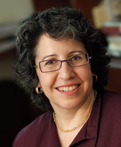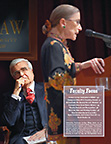Introducing Deborah Malamud
Professor of Law
Printer Friendly VersionDeborah Malamud is a leader among legal academics who study issues of class and public policy, as well as an expert on labor and employment law. She teaches in the fields of labor and employment law, constitutional law, and class and the law. She anticipates also teaching in NYU School of Law’s new first-year class, The Administrative and Regulatory State.
Malamud was on the faculty at the University of Michigan Law School from 1992 to 2003, where she was the James E. and Sarah A. Degan Professor of Law since 2001. Before embarking on her academic career, Malamud was a law clerk to Judge Louis Pollak, U.S. District Court for the Eastern District of Pennsylvania, and Justice Harry Blackmun of the U.S. Supreme Court, and a lawyer at Bredhoff & Kaiser, a leading union-side labor law firm, located in Washington, D.C. Malamud was a visiting professor at NYU School of Law in Spring 2002.
Her contributions to the study of class and the law focus on how the law reflects and helps to shape our understanding of what it means to be a member of the middle class in the United States. Her work on the New Deal illuminates the interaction between class and the law through close examination of the development and public defense of labor and welfare policies that drew boundaries between different types of workers. By looking at how and why government officials decided, for example, that white-collar workers ought to receive special treatment in federal relief programs, or that certain kinds of white-collar workers ought not be paid overtime because to treat them like “clock-punchers” would offend their dignity, she demonstrates that the law played an active role in defining class boundaries and in protecting them against erosion during the Great Depression.
Malamud has also explored related issues in contemporary settings, including the increasingly important debates about whether affirmative action policies should be restructured along lines of class rather than race, and what the complexities and consequences of such a restructuring would be. Rather than analyzing legal doctrines concerning employment, race, and class as internal matters of legal reasoning alone, Malamud has contributed to understanding the dynamic relationships between law and the social, political, and cultural contexts that it both reflects and helps to create. Representative publications include “Engineering the Middle Classes: Class Line-Drawing in New Deal Hours Legislation,” Michigan Law Review (1998); “Affirmative Action, Diversity, and the Black Middle Class,” Colorado Law Review (1997); and “Class-Based Affirmative Action: Lessons and Caveats,” Texas Law Review (1996).
Malamud received her B.A. from Wesleyan University and her J.D. from the University of Chicago Law School, where she was the articles editor of the University of Chicago Law Review and a member of the Order of the Coif. A native of Brooklyn, New York, Malamud, whose parents still live in Brighton Beach, is pleased to return to what she still calls “the City” after 25 years in Chicago, Philadelphia, Washington, D.C., and Ann Arbor. Her visiting semester convinced her that the rich diversity and high energy of New York are perfectly echoed in the student body and faculty of NYU School of Law. She looks forward to pursuing her existing interests in legal history, labor law, and social policy through teaching and faculty colloquia. Perhaps most of all, she is excited by the unknown. New York offers myriad ways to confront significant issues in contemporary American society and culture. She cannot wait to see which of its many paths she will choose to explore.
—


 Multimedia
Multimedia